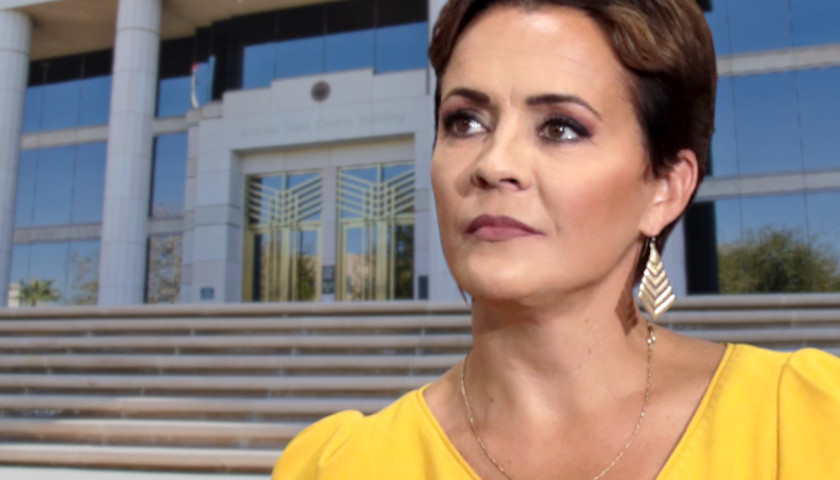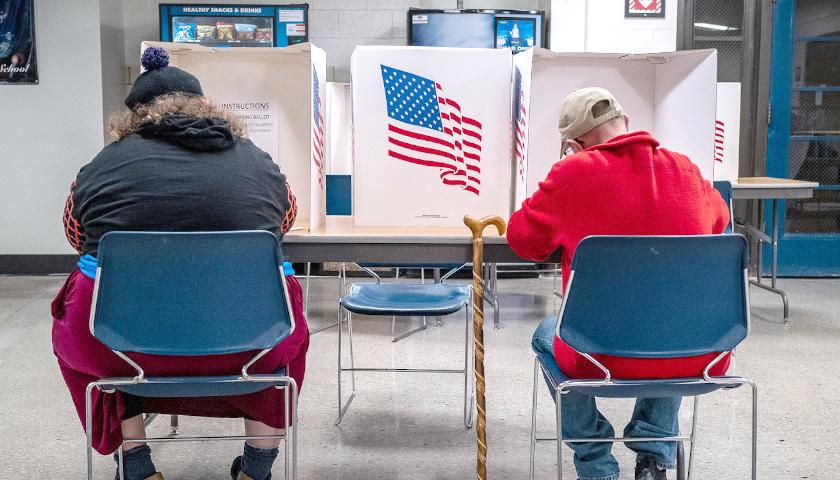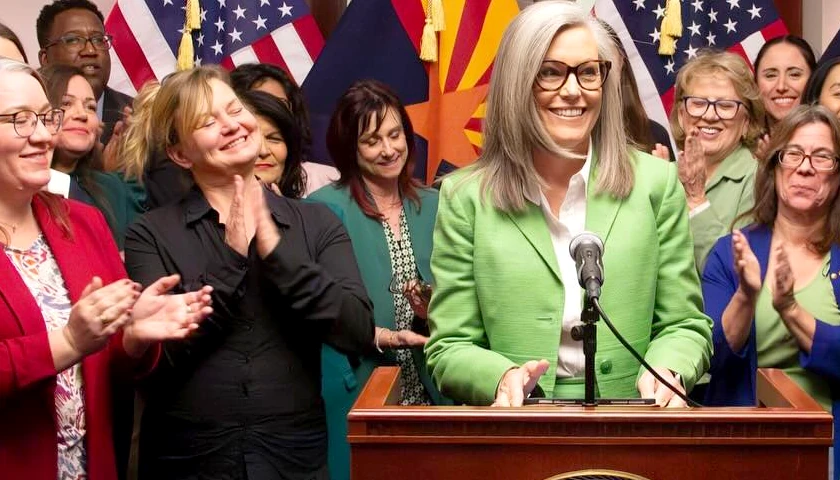The Arizona Supreme Court is holding a private conference on Tuesday to discuss whether to accept Kari Lake’s appeal of lower courts dismissing her lawsuit contesting her loss of the gubernatorial race. In addition to her initial petition for review, Lake filed a reply to the defendants’ responses to her petition, and The Gavel Project’s Ryan Heath filed his own amicus curiae brief supporting her.
The Arizona Sun Times spoke with Jennifer Wright, who served as the Arizona Attorney General’s Election Integrity Unit civil attorney under the previous Republican administration, but who joined Abe Hamadeh’s legal team in his election challenge in that race due to the current Democratic Attorney General Kris Mayes “targeting” her. Wright brought up one of the primary concerns Lake has pointed out about the lower courts’ dismissals; their reliance on a “clear and convincing” standard for evidence.
“The court should grant review to fix the legal errors by the lower courts reading in a clear and convincing standard of proof,” Wright said. “Such a standard of proof is ordinarily legislatively, not judicially prescribed. Creating an extra-statutory standard of proof is the kind of judicial activism that conservative courts typically deplore.” Republican governors appointed all seven members of the Arizona Supreme Court.
Lake’s reply summarized her objections to the responses from Katie Hobbs, Adrian Fontes, and Maricopa County, “In an effort to distract the Court from the core issues, all three Responses attempt to miscast the Petition as primarily raising new and contradictory disputes of fact concerning Maricopa’s violation of Arizona chain-of-custody laws.”
Lake explained that her claim that 35,563 unaccounted-for ballots were injected into the election at Runbeck Election Systems, the third-party private vendor assisting with ballot collection, “has been an issue since the inception of this case,” she said it is not some new claim that is barred from appellate review.
Lake said the respondents confused different chain-of-custody forms “to mislead this Court.” She said the trial court erred when it found that there were chain-of-custody forms with the number of ballots listed that existed for the Election Day drop box (EDDB) ballots that were transferred from Maricopa County Tabulation and Election Center (MCTEC) to Runbeck. Instead, Lake’s witness testified that these forms did not exist, and Maricopa County “admitted in its answering brief below that on Election Day Maricopa did not count EDDB ballots delivered to MCTEC, in violation of Arizona law, before transferring them to Runbeck.”
Lake said the respondents tried to confuse the forms filled out at Runbeck with those missing ballot counts at MCTEC. She pointed out that Hobbs’ pleadings cited both the MC Inbound – Receipt of Delivery forms, which totaled 263,379 ballots, but also the MC Incoming Scan Receipt forms, which adjusted that number up to 298,942 ballots — “an unaccounted for discrepancy of 35,563 ballots.”
Lake stated, “Even the court of appeals acknowledged the wrong standard was applied by the trial court with respect to whether ‘intentional misconduct’ was required to establish a claim under A.R.S. §16-672(a)(1).” That statute governs election contests.
Heath, with the assistance of Alexander Haberbush of the Lex Rex Institute, filed an amicus curiae brief on behalf of David Mast. Heath initially filed a writ of mandamus against the trial court judge, requesting that he be required to award the election to Lake. However, the court directed the court to file an amicus curiae brief instead, which he did with the Arizona Court of Appeals.
Heath’s argument emphasized that he believed the trial court erred by requiring a clear and convincing standard that the misconduct was intentional and meant to change the election, was performed by one of the appropriate people in charge, and that it changed the election. Instead, he said that merely violating a non-technical statute is enough to overturn an election, citing Reyes v. Cuming, a 1997 Arizona case involving similar circumstances, where signatures on the envelopes were not compared to the voter registration list, which violated a non-technical statute.
In his amicus curiae brief with the Arizona Supreme Court, Heath argued, “by requiring that Lake prove by clear and convincing evidence that electoral misconduct actually ‘affected the result’ of the election, the appellate court flew in the face of this Court’s precedent and imposed an insurmountable bar, effectively shielding election officials from recourse.”
In response to the lower courts’ contention that procedural challenges must be brought before an election, otherwise, they are barred by the doctrine of laches, Heath stated that Lake had no way of knowing before the election that these violations were occurring, and they weren’t procedural violations. “[H]er objections regarding verification were never objections to Maricopa’s existing election procedures but, rather, objections to the fact that votes were illegally counted,” he argued. He cited case law which distinguished the doctrine of laches from barring claims about “alleged acts of misconduct that occurred prior to an election” versus “acts of alleged misconduct that occurred during the ‘voting process.’”
Although there were some election procedures Lake could have challenged before the election, Heath said, it didn’t mean all of her election challenges fit that category. He pointed out that some of her objections related to activity that was not mentioned in Maricopa County’s election plan.
Heath cited several cases which held it is only necessary to show that it is “uncertain” that a number of affected votes could have affected the outcome. Lake showed that 35,563 ballots lacked a chain of custody, more than the difference in votes between her and Hobbs. Heath warned, “If this Court Were to Allow the Ruling of the Lower Court to Stand, it Would Render Electoral Misconduct Effectively Unreviewable.”
He explained how Arizona case law does not require Lake to show “how every voter would have voted absent the misconduct or irregularity” because “[t]he ‘uncertainty’ standard has never been held to mandate such proof.”
Heath reiterated one of his key arguments from earlier pleadings, which was that the Reyes case, which involved very similar circumstances, is a controlling precedent. There, the court found that since the county failed to comply with a non-technical statute, signature verification requirements, a new election was required. Heath listed some problems with Maricopa County’s signature verification, such as using “an ambiguous standard that allowed for the comparison of ballot affidavit signatures with legally prohibited documents.”
He noted that the difference between the candidates’ votes in Reyes was similar to the difference in the gubernatorial race, and that it had also been several months since the election, over a year in Reyes.
Finally, Heath said the Equal Protection Clause of the 14th Amendment of the U.S. Constitution was violated since Maricopa County voters were disenfranchised due to the county’s faulty signature verification process.
The Arizona Supreme Court does not have to accept Lake’s reply brief. However, Lake argued that “[b]ecause Respondents made material misrepresentations about the Petitioner’s arguments and one Respondent demanded sanctions based off of those material Misrepresentations,” she should be allowed to respond.
– – –
Rachel Alexander is a reporter at The Arizona Sun Times and The Star News Network. Follow Rachel on Twitter. Email tips to [email protected].
Photo “Kari Lake” by Gage Skidmore. CC BY-SA 2.0. Background Photo “Arizona Supreme Court” by davidpinter. CC BY 3.0.









Most people, using common sense, know how strong Trump backed candidates were defeated in the crooked elections of 2022. Election results were manipulated by machines and vote counts, by crooked Democrats and Rino Republicans. (Elections are won, not by actual votes but by who counts the votes). Therefore, results are not the actual winning candidates but the candidates that are the vote counters choice. If our elections continue in this manner we will never have true elections in the USA. What a shame for our Country.
All Arizona voters know Kari won! Hobbs rigged the election in her own favor, SHE was in charge of the election, since SHE was Secretary of State at the time. She should have been removed from that office as soon as she declared her candidacy. And—— she certified her own election! If that isn’t rigging, what is? Hobbs should be impeached immediately for illegal activity, along with Gates and Richer, her cohorts in this fiasco! Arizona voters must demand action now!